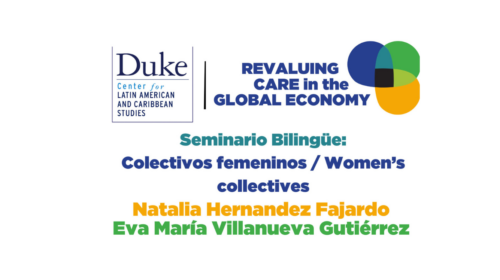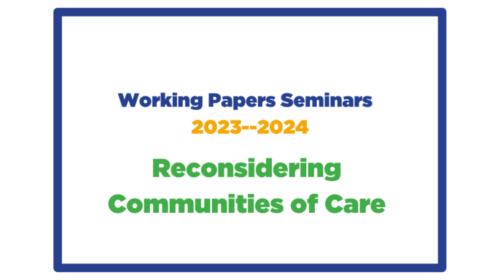Research

Women’s Collectives / Colectivos femeninos, May 3, 12-2 pm ET
Eighth Working Papers Seminar Series 2023-2024 Communities of Care featuring Natalia Hernandez Fajardo and Eva María Villanueva Gutiérrez , with commentaries by C. Cielo and Holly Worthen
Community Economies, April 19, 10-12 ET
Seventh Working Papers Seminar Series 2023-2024 Communities of Care featuring Alioscia Castronovo and Lina Penati Ferreira. Commentaries by Lindsay Naylor & AbdouMaliq Simone.
Working Papers Series 2022-2023
September 16, 2022. 11 am First seminar of the working papers series featuring Samia Akther-Kahn & André Pinhel.Commentaries by Anne Allison & Deborah Jenson Samia Akhter-Kahn, “Unpaid productive activities and loneliness in later life: Results from the Indonesian Family Life Survey (2000-2014)” André Pinhel, “Racial Classification Categories and Health Inequities Studies in Brazil and USA” […]
Race, Health & Disability February 23, 2024 12-2 pm ET
Sixth Working Papers Seminar Series 2023-2024 Race, Health & Disability featuring Jasper Conner and André Marega Pinhel. Commentaries by Mairead Sullivan and LaTonya Trotter
Alternative Care Networks January 26, 2024, 12-2 pm ET
Fifth Working Papers Seminar Series 2023-2024 Alternative Care Networks featuring Jieun Cho, Elizabeth Olson and Leiha Edmonds. Commentaries by Tatjana Thelen and Kim England
Queering Care December 1, 2023 10am-12pm ET
Fourth Working Papers Seminar Series 2023-2024 Queering Care featuring Nora Kassner, Tankut and Edward Nadurata. Commentaries by Pedro Augusto Gravatá Nicoli and Anjali Arondekar
Carcerality & Care. November 17, 2023 12-2pm ET
Third Working Papers Seminar Series 2023-2024 Communities of Care featuring Joseph Hiller and Katie Von Wald. Commentaries by Micol Seigel & Marisol Lebrón.
Migrant Domestic Workers October 27, 2023 12-2pm ET
Second Working Papers Seminar Series 2023-2024 Communities of Care featuring Valerie Francisco-Menchavez and Grazielle Valentim, with commentaries by Anju Mary Paul and Pallavi Banerjee
Caring Masculinities September 15, 2023, 12-2 PM ET
First Working Papers Seminar Series 2023-2024 Communities of Care featuring Tracie Canada and Antonia Randolph, with commentaries by J. Malton and M. Wallace

Working Papers Seminar Series 2023-2024: Reconsidering Communities of Care
The experiment of sharing research continues. One or two presenters share original unpublished papers beforehand and two respondents offer insights and reflections. Working papers seminars series are open to the general public upon signing up. The events in February, April, and May are sponsored by CLACS
Working Papers Series 2021-2022
First experiment of sharing research. One or two presenters share original unpublished papers beforehand and two specialized commenters offer insights and reflections. Working papers series are open to the general public upon signing up